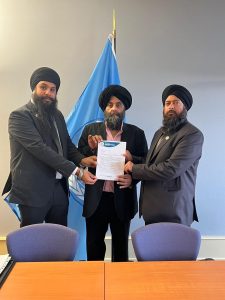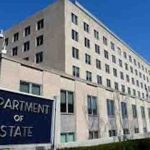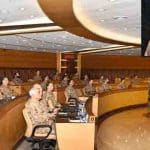UN experts tell Indian delegation to address reality of abuses – posturing will not do
Geneva (PNI) India’s disreputable efforts to avoid an examination of its human rights record by the UN’s leading human rights experts came to an embarrassing end in Geneva this week. Over twenty years after it was due, the Human Rights Committee (HRC) finally managed to review India’s compliance with the provisions of the 1966 International Covenant on Civil and Political Rights (ICCPR).
World Sikh Parliament members followed up a powerful 24-page written submission with face-to-face interactions with HRC members in Geneva, hours before a top-level Indian delegation was grilled by the HRC on India’s appalling record of systematic abuses. That record stretches back years but is now widely recognised by the world as a growing menace, driven by a fascist majoritarian dispensation.

The Sikhs provided compelling evidence of India’s egregious breaches and how they had defined the Indo-Sikh conflict in Punjab. They called for robust UN intervention, so that peaceable conflict resolution and justice can be brought about in a process underpinned by international law. Whilst exposing the undeniable, systematic abuse of individual human rights which has caused untold death and misery, the Sikhs emphasised the need to hold India to account for denying the Sikh nation its right of self-determination.
The right of self-determinaƟon is enshrined in Article 1 of the ICCPR and the HRC rightly sees it as the bedrock on which all other human rights depend. Crucially, India has entered a formal ReservaƟon against it, absurdly claiming that it does not apply to the nations held captive in Indian-held territory. The HRC once again, during this week’s encounter, asked India to withdraw that Reservation.
India’s top diplomat at the UN in Geneva, Arindam Bagchi, brazenly refused the request, making a mockery of his 32-member delegation’s outlandish aƩempt to present India as a champion of human rights. Time and time again HRC members told the Indian delegation they were not interested in their pointless posturing about consƟtutional, statutory and institutional provisions that promise much and deliver little; this was meant to be a serious exercise which required genuine engagement by addressing the reality of the dire human rights situation in the country.
With India’s Solicitor General (Tushar Mehta) and Attorney General (R. Venkataramani) also fronting the Indian delegation, this was an uncomfortable and embarrassing occasion for India’s narrative creators. India’s unwillingness to treat the review seriously should be an alarm call for the international community. Seasoned observers of the atrocious human rights position in India understand this already – but it is time decision makers in the leading capitals of the world tackle a worsening problem that has seen even their own sovereign rights challenged by the lawless Indian state.
HRC member Marcia Kran, a senior human rights expert from Canada where a leading Sikh activist was assassinated last year by Indian agents, said the HRC was “deeply troubled” by India’s recently-exposed transnational repression against Sikhs and others, in which India’s intelligence services along with highranking government officials, have executed political opponents in many countries “in violation of international law”. Her request for assurances to end those illegal activities and to bring perpetrators to justice was met with a simple assertion that these matters were ‘under investigation’, so no such assurances could be given. The Sikhs thanked the HRC and the many civil society organisations who have contributed to a review that eventually was held aŌer an incredible 27 years of waiting. They will maintain a dialogue with the HRC which will shortly be issuing its concluding recommendations on India’s lack of compliance with its ICCPR obligations.
The World Sikh Parliament’s unprecedented engagement with the HRC in this process has placed on record the Sikh nation’s core human rights concerns. The UN and the international community have been reminded that the Sikhs are committed to exercising their right of self-determination in the form of a sovereign, independent homeland in Punjab, as well as to ensuring international legal accountability for the genocidal attacks made against it by Indian state and non-state actors over the last 40 years.
The release of political prisoners, the right to freely practice the Sikh religion (currently classed as part of Hinduism in the Indian constitution), the safeguarding of Punjab’s territory and river waters, and the right to freedom of expression were all addressed in a successful initiative that has demonstrated that India is in the dock when it comes to international law and its conflict with the Sikhs. The Sikh struggle for freedom and justice, by contrast, is underpinned by internationally accepted legal standards.
The World Sikh Parliament is committed to that struggle and calls on all Sikhs to contribute to that national endeavour by engaging with all available political, legal and societal mechanisms. India’s humiliating return to the HRC this week, after 27 years of hiding, shows that there is ultimately no place to hide for a lawless state. Indian PM Modi and his henchmen must learn the lesson that ‘might is not right’ – and international accountability cannot be avoided.
Follow the PNI Facebook page for the latest news and updates.









